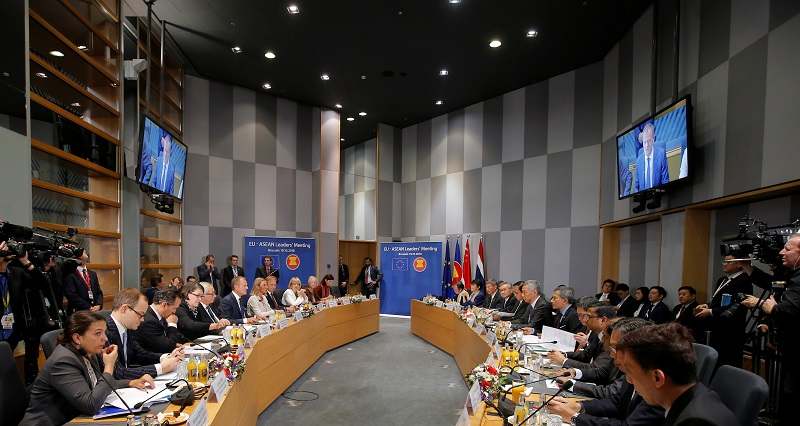
General view of the room during the EU-ASEAN meeting on the sidelines of the EU-ASEM summit in Brussels, Belgium, October 19, 2018.
12:46 JST, September 24, 2021
Will the new strategy adopted by the European Union be an opportunity for the EU to review its relations with China and increase its involvement in the Indo-Pacific region? It is necessary to keep a close eye on future developments while ascertaining commonalities and differences between the EU strategy and those of Japan and the United States.
The EU has drawn up its first “strategy for cooperation in the Indo-Pacific.” Based on the recognition that the region holds the key to international order, the EU expressed its intention to make efforts to strengthen its relations with countries in the region and with the Association of Southeast Asian Nations (ASEAN).
Among EU nations, France and Germany have already come out with their own Indo-Pacific policies. However, it is significant that the 27-member EU as a whole has presented a direction for that purpose.
The strategy makes it a priority issue to build close trade and investment ties with the Indo-Pacific region. As specific goals, the EU said in the strategy that it would conclude economic agreements with Australia, India and other countries. The EU apparently wants to tap into the growth of the region for the sake of the EU’s own development.
To strengthen semiconductor supply networks, the strategy states that the EU will promote cooperation with Taiwan, as well as Japan and South Korea. The EU’s aim to reduce reliance on China and diversify its supply networks is also shared by Japanese and U.S. strategies.
China is the EU’s largest trade partner, and the EU’s emphasis on economic relations with China has been notable. However, China’s suppression of human rights in the Xinjiang Uygur Autonomous Region and Hong Kong has forced the EU to reconsider its conventional policies.
The strategy this time pointed out, “Democratic principles are under threat from authoritarian regimes in the Indo-Pacific region.” It also stressed the need to support freedom of navigation and the rule of law. Although it does not name names, its intention of containing China is obvious.
In the strategy, the EU also called on Japan, South Korea and Singapore to cooperate in setting standards for the use of advanced technology that gives consideration to human rights, bearing in mind China’s surveillance technology using artificial intelligence. It seems that the EU intends to prevent China from achieving dominance in this respect.
However, the EU’s stance toward China is not as stern as that of the United States. In the strategy, the EU confirmed its basic stance of seeking the implementation of an investment treaty with China, the ratification of which has been suspended by the European Parliament.
As for maintaining maritime order in the Indo-Pacific region, the strategy merely uses an expression that the EU will explore ways to ensure “enhanced naval deployments by its member states” in the region. As long as the EU does not have its own military, it must be said that there is a limit to the EU’s security contribution in the region.
A Dutch Navy warship accompanied a British aircraft carrier to participate in a joint exercise with the Self-Defense Forces. A German warship is also heading for Japan. Japan, the United States and other countries concerned need to deepen cooperation with the EU through such individual activities.
— The original Japanese article appeared in The Yomiuri Shimbun on Sept. 24, 2021.
Top Articles in World
-

Israeli Ambassador to Japan Speaks about Japan’s Role in the Reconstruction of Gaza
-

Videos Plagiarized, Reposted with False Subtitles Claiming ‘Ryukyu Belongs to China’; Anti-China False Information Also Posted in Japan
-

North Korea Possibly Launches Ballistic Missile
-

Chinese Embassy in Japan Reiterates Call for Chinese People to Refrain from Traveling to Japan; Call Comes in Wake of ¥400 Mil. Robbery
-

Russia: Visa Required for Visiting Graves in Northern Territories, Lifting of Sanctions Also Necessary
JN ACCESS RANKING
-

Japan PM Takaichi’s Cabinet Resigns en Masse
-

Japan Institute to Use Domestic Commercial Optical Lattice Clock to Set Japan Standard Time
-

Israeli Ambassador to Japan Speaks about Japan’s Role in the Reconstruction of Gaza
-

Man Infected with Measles Reportedly Dined at Restaurant in Tokyo Station
-

Videos Plagiarized, Reposted with False Subtitles Claiming ‘Ryukyu Belongs to China’; Anti-China False Information Also Posted in Japan
























